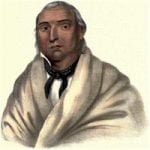
Sparrowhawk that comes to you walking
A Sioux Chief
The name of this individual is, in his own language, Chatonwahtooamany, or the “Sparrowhawk that comes to you walking.” The French gave him the name of Petit Corbeau, and the English appellation, placed at the head of this sketch, is a translation from the latter.
He visited Washington city in 1824, and was, at that time, head chief of the Kahpozhay band, of the Mundayrvahkanton, and a person of some consideration. He claims to Be. and perhaps is, by hereditary right, the head chief of the whole Sioux nation; but he has fallen into disrepute, and is, at this time, without any influence even in his own band. He resides at a distance from his band, on or near the western shore of Lake Superior; is cunning, artful, and treacherous; is not much distinguished as a warrior, but is very successful as a hunter, especially of beaver. The name Kahpozhay, or Kapoja, as others understand it, signifies light, and is applied to this band, to indicate that they are more active than the other branches of the Sioux, or Dacotah family.
Soon after peace was declared between the United States and Great Britain, in 1815, the Sioux were invited by the commanding officer at Drummond’s island, to visit, that post. On their arrival, the Indians were informed by the officer, that he had sent for them to thank them, in the name of his majesty, for the aid they had rendered the British during the late war, and for the bravery they had displayed on several occasions, as well as to communicate the intelligence of the peace which had been declared between the great belligerent parties. He concluded by pointing to a large pile of goods that lay heaped upon the floor, which, he told them, were intended as presents for themselves. The Little Crow replied, that his people had been prevailed upon by the British to make war upon a people whom they scarcely knew, and who had never done them any harm. “Now,” continued he, “after we have fought for you, endured many hardships, lost some of our people, and awakened the vengeance of a powerful nation, our neighbors, you make a peace for yourselves, and leave us to get such terms as we can. You no longer need our services, and offer us these goods as a compensation for having deserted us. But no we will not take them; we hold them and yourselves in equal contempt.” So saying, he spurned the articles of merchandise with his foot, and walked away. This conduct was the more remarkable, from its inconsistency with the gravity and decorum with which the chiefs usually deport themselves on public occasions. The Indians, however, who were not so sensitive in regard to the injury supposed to have been done them, received the goods.
The Little Crow has a son named Big Thunder, who is a fierce and terrible fellow. A few years ago, the father and son took a long journey to the north-west, in search, as they pretended, of knowledge. They visited the British settlement at Pembina, and attended a great meeting at Lake Travers, at which fifteen hundred warriors are said to have been present, from the Assiniboin, Mandan, Minnetaree, Ioway, and other tribes, as well as from each of the tribes of the Dacotah nation. On this solemn occasion, the various speakers all addressed the Little Crow by the title of “Father;” thus, according to their rules of etiquette, in the observance of which they are exceedingly tenacious, acknowledging him to be superior, by hereditary right, to all other Dacotah chiefs, and the
Dacotah nation as superior to their own. The festivities, which lasted almost a fortnight, consisted of dances, songs, and repasts; the principal feast was celebrated on the 25th of June; and, as the buffalo were abundant at that season, a great number were killed.
The Kahpozhay band have but one village, which is on the Mississippi river, below the mouth of the St Peter’s.
